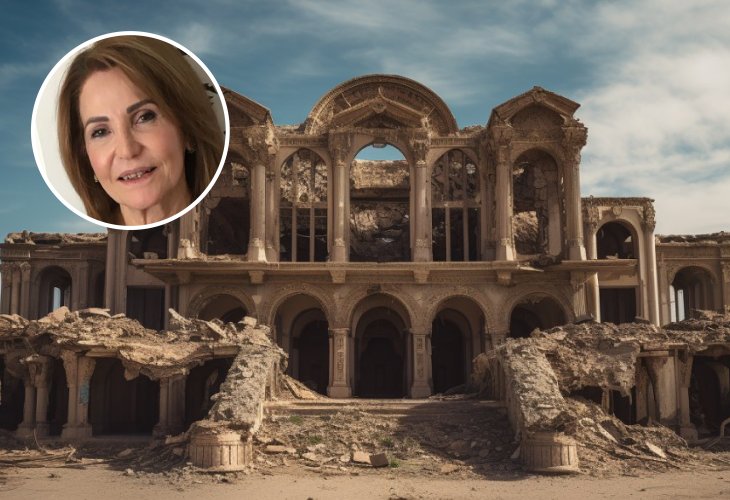A Great Escape: Surviving Iraq's 'Palace of the End'
Decades after the execution of nine Jews in Iraq, Joyce Sason recalls those dark days, her father-in-law's imprisonment, and her great-grandfather, the Ben Ish Chai.

The year was 1968 when Shaul Sason, the son of the illustrious Rabbi Sason, leader of the Iraqi Jewish community, found himself imprisoned in Iraq's most notorious jail - 'Qasr al-Nihaya,' or 'Palace of the End.' This nightmare was a familiar one for Joyce Sason, his daughter-in-law, who now resides in Israel. She vividly remembers the impossible fear their family endured while her father-in-law was there, and how he miraculously survived.
Fifty-five years later, as the Jewish community marks the anniversary of the Iraqi Ba'ath regime's tragic execution of nine Jews under spurious charges of spying, Joyce reflects on that perilous time. 'His fate was nearly like theirs,' she recounts, 'but he was miraculously freed'.
Joyce recently shared these harrowing memories during a ceremony at the Babylonian Jewry Heritage Center, as old traumas are resurfacing in light of current conflicts in Israel. She has kindly agreed to share her story with us, providing a window into those unforgettable days.
Turbulence in the Streets
Joyce takes us back to her childhood days: 'I was born in Baghdad to my father, Rabbi David, the grandson of the Ben Ish Chai – Rabbi Yosef Chaim, of blessed memory," she shares. 'I married young to Zohair, the grandson of Rabbi Sason Kadourie, who led the community from the 1930s until 1970. Thus, we built our home with a distinguished lineage from both sides.'
According to Joyce, in typical Baghdadi Jewish tradition, they held an engagement ceremony with a formal agreement and glass breaking, considered as significant as the wedding itself. A few months later, their wedding took place at the Frank Iny Jewish School's assembly hall.
'My husband Zohair was the son of Shaul Sason,' Joyce says. 'We got married just before the revolutionary upheaval, enjoying a joyful life together. Initially, we lived in our own apartment, but after 1967, with the eruption of violence following the Six-Day War in Israel, we moved in with my in-laws to stay united. Although I deeply respected my father-in-law, the atmosphere outside was daunting. We frequently heard about Jews being 'taken to jail,' a virtual death sentence as very few returned.'
What accusations were made against your father-in-law?
'It was an unfounded denunciation. My father-in-law had numerous Muslim friends over the years. During the revolution, the authorities captured one such 'friend' and tortured him. In his desperation, they offered him a deal: name a Jew, and he would be freed. He provided my father-in-law's name, which led to his arrest. As Saddam Hussein seized power, Jewish life deteriorated sharply. It was understood among Jews that our future in Iraq was bleak, yet escaping seemed impossible.'
Inside the 'Palace of the End'
Were you able to visit your father-in-law while he was imprisoned?
'Officially, visits were forbidden, but given that he was the community leader's son, a meeting was arranged for his father and Zohair. He described the brutal tortures he endured. Zohair was utterly devastated after that encounter. It seemed inevitable that his father's life would end at 'The Palace.' I was heavily pregnant at the time. After I gave birth, my mother-in-law felt compelled to share the news with her husband. She courageously approached the prison, bringing traditional Iraqi Jewish candies coated with sugar, as a surrogate birth announcement. The almonds symbolized a brit milah, signaling to him that I had birthed a son.'
To this day, Joyce cannot explain her father-in-law's sudden release, yet it was apparent to them that remaining in Iraq posed a mortal threat. They needed to reach Israel swiftly. At that time, many Jews fled Iraq through Kurdish contacts, a plan Joyce and her husband longed to join. However, the recent arrest of 136 Jews at the Iranian border forced them to delay their escape.
'Meanwhile,' Joyce recounts, 'my in-laws miraculously obtained passports and planned to travel to London, then onto Israel. They offered to take our son, their grandson, with them. Miraculously, my mother-in-law was granted special permission, cited as his sole caregiver, to have him entirely in her care. It was heartbreaking to part with him indefinitely, but we knew it was the only way to secure his safety and expedite our own escape.'
Fleeing and Reuniting
Two months later, they seized an opportunity offered by a local acquaintance who organized an escape with his family. 'A group of 12, we were among the last Jews to leave Baghdad,' Joyce recalls. 'We embarked on a perilous journey, crammed into a minivan before switching to a larger truck mid-route. Thereafter, donkeys carried us towards the Iranian border, rotating between walking and riding, all under the cover of silence and fear. Only upon reaching Tehran did we feel a semblance of safety, allowing us to continue on to Israel, finally reuniting with Zohair's parents and our little boy.'
It has been nearly half a century since your escape. Do current conflicts bring back these memories?
'Honestly, I am deeply faithful and believe there is no comparison between Iraq and what occurs here in the Holy Land, a place chosen by the Creator for His presence. In Iraq, fear was tangible, while here, I feel no fear. Though the conflict is challenging and I hope for a swift resolution, I firmly believe that Hashem is with us and wants our lives to persist here. Surely, He is fighting for us.'

